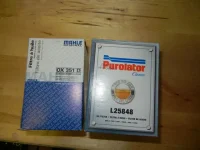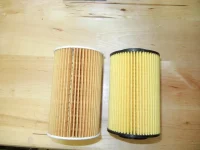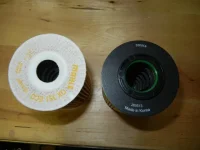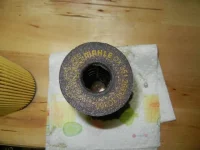wd40
Registered Member
Oil Filter Comparison
Purolator L25848-57 pleats
Mahle OX 351 D-54 Pleats
There has been a lot of conversation as to what type of filter replacement should be used (OEM vs. aftermarket). Certain forum aficionados are hardcore OEM while I’ve read aftermarkets are of high quality. I change the oil on my unit twice a year, which might be overkill since mileage varies between 550 and 600 miles per month. I decided to order two recommended oil filters and compare the quality. Both were ordered from Amazon with free shipping over $25.00. I also ordered an air filter to get me to the free shipping mark. I suppose I could have ordered five or six different brands but after looking at them I wonder if there would be any significant difference.
I purchased my vehicle with just less than 3K miles (it was driven by the owner of the dealership) and the dealer did a courtesy oil change prior to delivering the vehicle. The shop receipt shows 5W-30 Castrol Synthetic-I asked them to use synthetic. The owner’s manual says you can use either 5W-20 or 5W-30 but using 5W-20 increases fuel mileage. Interesting concept, but in the desert where the temps are 110 plus several months a year I figured to use the 5W-30. Probably makes no difference.
Odometer just hit seven thousand miles so I decided to give it a go, do it myself and save a bunch of money. I’ve attached a few pics of the two filters. Ironically the installed filter the dealer used is a Mahle. Sure wish Hyundai would make some sort of access panels so we don’t have to remove the skid plate (engine cover) whatever. By the way, I know there have been issues on the forum regarding oil consumption but I guess I’m one of the lucky ones. Not a drop below the fill mark since the last oil change.
Both filters seem to have a high degree of quality. Filter media is slightly different.
Mahle OX 351 D-54 pleats of filter material.
Purolator-57 pleats of material.
The pleat material in the Mahle (is slightly longer but the Purolator has hard plastic end caps with plastic spacers and O-rings. The Mahle has a woven fabric type material for end caps with no O-rings. The Mahle appears to be a compression fit.
I called both manufacturers in an attempt to get some technical data on the filters. Simple questions, what type of media is used for construction and how many square inches of media are in the filters? Mahle and Purolator took my number and said they would research it and call me. I’m still waiting.
I also asked Purolator where the filters are manufactured. As you can see in the pics the top of the filter says made in Korea but the box says manufactured in China. I asked if the filter was made in Korea and maybe the packaging was made in China but no one knew the answer. I added some interesting reading I found regarding filters with testing. That’s it-my car is happier since the oil change. Happy motoring.
http://filtrationcomparisons.weebly.com/test-pictures-and-results.html
Oil Filtration Comparisons From the Workbench
Home
Do Oil Filters Even Matter?
more...
Do oil filters matter?
That depends on who you talk to...or what you read.
The late, great Bob Winters of Bobistheoilguy.com fame ran his car with the oil filter completely bypassed to see if it would make a difference on used oil laboratory analysis results. Apparently there was no conclusive evidence that the filter made any difference in the oil contamination levels that the laboratory analysis could detect.
...In my opinion, since there seems to be a limit in particle size that oil analysis labs can detect, this does not necessarily mean there were no filterable abrasive particles in the oil anyway.
...................................................
Remember the original Volkswagen Beetle?
These engines originally used no filters at all and they seemed to reach 100,000 miles at least as often as other cars' engines that had filters.
...To be fair, the strategy for a well maintained, long lived old VW engine was to change the oil about twice as often as filtered engines required it. This would certainly get rid of most of the build up of abrasive particles and sludge in the VW engine.
....................................................
Ford Motor Company experimented with some of the first full flow oil filters (the modern method where all oil must pass through the filter on the way to the engine internals) back in the 1950s and found an approximate halving of abrasive engine wear...And this with the likely primitive filter media available at the time.
...................................................
Other credible sources say that the filter you choose is more important to engine longevity than the oil you use.
...But then again, look how cars so often go 200,000 or even 300,000 miles nowadays with little owner thought or knowlege about filters or oil. They just use whatever the shop or oil change place uses.
********************************
Bottom line for me? Having seen the junk stuck to used filter elements that have been opened, I don't want that stuff flowing around in my engine between oil changes.
Next: Flow vs Filtration
Create a free website with http://www.weebly.com/?footer




Purolator L25848-57 pleats
Mahle OX 351 D-54 Pleats
There has been a lot of conversation as to what type of filter replacement should be used (OEM vs. aftermarket). Certain forum aficionados are hardcore OEM while I’ve read aftermarkets are of high quality. I change the oil on my unit twice a year, which might be overkill since mileage varies between 550 and 600 miles per month. I decided to order two recommended oil filters and compare the quality. Both were ordered from Amazon with free shipping over $25.00. I also ordered an air filter to get me to the free shipping mark. I suppose I could have ordered five or six different brands but after looking at them I wonder if there would be any significant difference.
I purchased my vehicle with just less than 3K miles (it was driven by the owner of the dealership) and the dealer did a courtesy oil change prior to delivering the vehicle. The shop receipt shows 5W-30 Castrol Synthetic-I asked them to use synthetic. The owner’s manual says you can use either 5W-20 or 5W-30 but using 5W-20 increases fuel mileage. Interesting concept, but in the desert where the temps are 110 plus several months a year I figured to use the 5W-30. Probably makes no difference.
Odometer just hit seven thousand miles so I decided to give it a go, do it myself and save a bunch of money. I’ve attached a few pics of the two filters. Ironically the installed filter the dealer used is a Mahle. Sure wish Hyundai would make some sort of access panels so we don’t have to remove the skid plate (engine cover) whatever. By the way, I know there have been issues on the forum regarding oil consumption but I guess I’m one of the lucky ones. Not a drop below the fill mark since the last oil change.
Both filters seem to have a high degree of quality. Filter media is slightly different.
Mahle OX 351 D-54 pleats of filter material.
Purolator-57 pleats of material.
The pleat material in the Mahle (is slightly longer but the Purolator has hard plastic end caps with plastic spacers and O-rings. The Mahle has a woven fabric type material for end caps with no O-rings. The Mahle appears to be a compression fit.
I called both manufacturers in an attempt to get some technical data on the filters. Simple questions, what type of media is used for construction and how many square inches of media are in the filters? Mahle and Purolator took my number and said they would research it and call me. I’m still waiting.
I also asked Purolator where the filters are manufactured. As you can see in the pics the top of the filter says made in Korea but the box says manufactured in China. I asked if the filter was made in Korea and maybe the packaging was made in China but no one knew the answer. I added some interesting reading I found regarding filters with testing. That’s it-my car is happier since the oil change. Happy motoring.
http://filtrationcomparisons.weebly.com/test-pictures-and-results.html
Oil Filtration Comparisons From the Workbench
Home
Do Oil Filters Even Matter?
more...
Do oil filters matter?
That depends on who you talk to...or what you read.
The late, great Bob Winters of Bobistheoilguy.com fame ran his car with the oil filter completely bypassed to see if it would make a difference on used oil laboratory analysis results. Apparently there was no conclusive evidence that the filter made any difference in the oil contamination levels that the laboratory analysis could detect.
...In my opinion, since there seems to be a limit in particle size that oil analysis labs can detect, this does not necessarily mean there were no filterable abrasive particles in the oil anyway.
...................................................
Remember the original Volkswagen Beetle?
These engines originally used no filters at all and they seemed to reach 100,000 miles at least as often as other cars' engines that had filters.
...To be fair, the strategy for a well maintained, long lived old VW engine was to change the oil about twice as often as filtered engines required it. This would certainly get rid of most of the build up of abrasive particles and sludge in the VW engine.
....................................................
Ford Motor Company experimented with some of the first full flow oil filters (the modern method where all oil must pass through the filter on the way to the engine internals) back in the 1950s and found an approximate halving of abrasive engine wear...And this with the likely primitive filter media available at the time.
...................................................
Other credible sources say that the filter you choose is more important to engine longevity than the oil you use.
...But then again, look how cars so often go 200,000 or even 300,000 miles nowadays with little owner thought or knowlege about filters or oil. They just use whatever the shop or oil change place uses.
********************************
Bottom line for me? Having seen the junk stuck to used filter elements that have been opened, I don't want that stuff flowing around in my engine between oil changes.
Next: Flow vs Filtration
Create a free website with http://www.weebly.com/?footer










